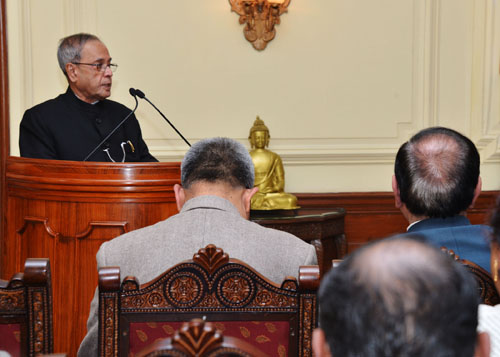Speech by the President of India, Shri Pranab Mukherjee at the Presentation of International Gandhi Award for Leprosy - 2013
Rashtrapati Bhavan, New Delhi : 15.02.2014
 (107.65 KB)
(107.65 KB)
Ladies and Gentlemen,
I am indeed happy to be present amidst you on the occasion of presentation of the International Gandhi Award for leprosy. I extend my heartiest congratulations to the recipients of this award for the year 2013 - Prof. Guocheng Zhang and Dr. V. V. Dongre who have both dedicated several decades of their lives to eradicating leprosy through treatment, training and research. They deserve our deepest appreciation for their service to the cause of humanity. I hope that their contribution inspires many more to join the crusade for ending this social malaise and empowering those suffering from leprosy.
The International Gandhi Award instituted by the Gandhi Memorial Leprosy Foundation commemorates Mahatma Gandhi’s service and scientific approach towards leprosy by recognizing the commendable contributions of individuals and institutions in ameliorating the quality of life of people afflicted with leprosy.
Mahatma Gandhi’s compassion for patients of leprosy is well known. He understood the social dimensions of this disease and worked relentlessly to reintegrate patients of leprosy into the social mainstream. In an era, when ignorance about the disease was at its peak, he led by example – often tending to leprosy patients personally. His efforts to eliminate the social ostracism accorded to people afflicted by leprosy went a long way in spreading awareness about the disease.
Ladies and Gentlemen,
Over several centuries, leprosy had remained a dreaded and incurable disease. Patients were viewed with abhorrence, ostracized and subjected to inhuman treatment. Today, the stigma and prejudice against leprosy has reduced considerably, thanks to the constant work of scientists and researchers. We have successfully achieved elimination and are now moving towards eradication of leprosy.
In most endemic countries, leprosy control has improved significantly through national and sub-national campaigns and focused strategies to treat it as a public health problem. This improvement has been possible due to the availability of effective multiple drug treatment to cure the disease, increased awareness as well as access to technology.
The Gandhi Memorial Leprosy Foundation which was established in 1950 has done pioneering work to eradicate the disease and to erase the stigma associated with the disease. At a time when patients of leprosy were abhorred and socially isolated, the Foundation worked to ensure integration of leprosy patients into the social mainstream.
In 2012-13, India recorded around 83,000 leprosy cases with a prevalence of 0.68 per 10,000 population. I am happy to note that until 1st April 2012, 33 States and Union Territories had attained the levels of leprosy elimination of less than 1 case per 10,000 population. 542 districts out of 640 had also achieved elimination by March 2012.
Nevertheless, it is a cause of concern that new cases continue to occur and high-burden pockets of the disease do exist. The State of Chhattisgarh and the Union Territory of Dadra and Nagar Haveli still have a prevalence rate between 2 and 4 per 10000 population. Bihar, Maharashtra and West Bengal, which had achieved elimination earlier, have now shown a slight increase in prevalence of leprosy in the current year. I understand that 209 high endemic districts have been identified in 2012-13 which need our focused attention.
The need of the hour is to intensify our efforts towards early detection of leprosy cases, provide equitable access to appropriate treatment and provide integrated leprosy services in the geographically focused areas. Over the years, the scourge of leprosy has remained a blot on humanity. More than the medical condition, the social stigma attached to the disease is a cause for concern. There is a need to empower those who have been socially discriminated an account of leprosy, through advocacy and information dissemination. Social challenges for leprosy do persist, but at the same time, it is heartening to note that the United Nations has now passed a resolution on discrimination against people affected by leprosy and efforts are being made to repeal laws that prevent people affected by leprosy from participating in society.
Ladies and Gentlemen,
Each year, around 250,000 new leprosy cases are detected, almost 60 per cent of which are in India. The major challenge in leprosy control activities lies in sustaining the same level of focus and commitment especially in low-resource settings where equity of access is an issue. This is necessary, otherwise all that has been achieved with regard to control of leprosy will be undermined. Specialist services for leprosy are no longer sustainable or cost-effective. The responsibility now lies with all aspects of the general health care system to be vigilant for diagnosing and treating leprosy early so that people affected by leprosy receive care within the general health services.
The latest WHO Expert Committee has set the challenge to reduce the rate of new patients with disability due to leprosy to 1 in a million by 2020. This challenge can be met only through a multi – dimensional and integrated approach. On this occasion, I urge all stakeholders to come together and make concerted efforts for the total eradication of leprosy. I also wish the Gandhi Memorial Leprosy Foundation and all those involved in this noble mission all success in their endeavors.
Thank you.
Jai Hind.








